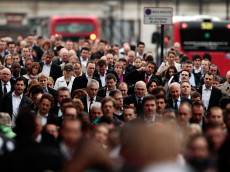March 30, 2015
Driverless cars will transform the UK economy by 2030, claims report
 A new study from the Society of Motor Manufacturers and Traders (SMMT) and KPMG claims that the development of connected and autonomous vehicles will help generate 320,000 jobs in the UK and deliver huge benefits to society and the economy. The first ever comprehensive analysis of the opportunities provided by the new technology claims that by 2030 driverless cars will deliver a £51 billion boost to the UK economy, reduce congestion and carbon emissions and cut serious road traffic accidents by more than 25,000. By that time all new cars will incorporate some form of connectivity, according to the report’s authors. It also predicts that the UK will be a global leader in the production of this next generation of vehicles, with the support of Government including financial backing. The study was presented at last week’s SMMT conference in London.
A new study from the Society of Motor Manufacturers and Traders (SMMT) and KPMG claims that the development of connected and autonomous vehicles will help generate 320,000 jobs in the UK and deliver huge benefits to society and the economy. The first ever comprehensive analysis of the opportunities provided by the new technology claims that by 2030 driverless cars will deliver a £51 billion boost to the UK economy, reduce congestion and carbon emissions and cut serious road traffic accidents by more than 25,000. By that time all new cars will incorporate some form of connectivity, according to the report’s authors. It also predicts that the UK will be a global leader in the production of this next generation of vehicles, with the support of Government including financial backing. The study was presented at last week’s SMMT conference in London.



























December 2, 2014
Whatever you might hear, the death of the office is still some way off
by David D'Souza • Comment, Facilities management, Flexible working, Workplace, Workplace design
I was recently asked to join a roundtable about the future of office working at the offices of The Guardian newspaper. Being a simple soul I was quite confused to be asked about the ‘death of the office’ whilst sitting in an office. It seemed not only alive, but also very present. But maybe the sun is starting to set on that way of working. You can find the overview here and I’d draw your attention to the fact that according to The Guardian I had, after 2 hours, reached a point where I was ‘speaking for the whole meeting’. I’m sure I only spoke for part but it may have seemed more to others present. More →